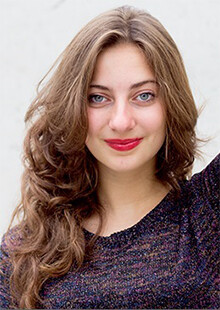Postgraduate Fellow Spotlight: Louise Willocx ’19

Louise Willocx ’19 discusses her time so far as a Robina International Human Rights Fellow4 at the Special Jurisdiction for Peace in Bogotá, Colombia.
How long have you been working at the Special Jurisdiction for Peace?
I started my fellowship in September 2021. However, in 2019, I was also a Kirby Simon Summer Fellow at the SJP, which was such an interesting experience that I decided to return to the Court in 2021 as a Robina Fellow.
What does your work as a clerk for Justice Julieta Lemaitre entail?
I advise her on the international legal aspects of our cases. For instance, I have written memoranda on whether certain acts would be considered war crimes or crimes against humanity, or whether there is scope under international criminal law to charge perpetrators for the particular environmental and cultural damage done to the Indigenous population. I also draft the parts of the ruling concerning international law.

Could you describe the case you’re working on?
Most of my work has been related to the Court’s first macro-case, on the arbitrary deprivations of liberty and kidnappings by FARC (Fuerzas Armadas Revolucionarias de Colombia or Revolutionary Armed Forces of Colombia). The FARC has deprived civilians of their liberty for various reasons: kidnappings for ransom was a key part of their financial strategy, but they would also detain civilians to obtain free labor, to maintain social control over certain areas, or for no clear reason at all.
About a year ago, the first indictment was handed down, which charged the highest FARC leaders with deprivation of liberty-related crimes. We are now simultaneously working on amending the indictment and expanding it to mid-level commanders. I have mostly been working on proposed amendments to the indictment including, for example, whether the charge of enslavement could be added.
What are some of the challenges of working on the first case against the FARC?
The particular circumstances of the conflict raise many novel and difficult legal questions. It is absolutely fascinating to figure out what a reasonable answer would be and to contribute to these precedent-setting cases in a politically tense context.
Moreover, the hybrid nature of the court, being between a truth commission and an international criminal tribunal, also gives rise to important procedural issues. The procedures are more cooperative than adversarial, but there is a risk that this approach leads to fundamental safeguards being disregarded. We are constantly seeking to balance these competing considerations.
How has the pandemic impacted your fellowship year or the subject of your work?
I postponed my fellowship for one year because I would have had to work from home and would not have been allowed to attend hearings, make field trips, or interact with parties. Waiting a year has given me a better grasp of the culture and the conflict.
What past experiences — at Yale Law School or before — have motivated you to spend your fellowship at the Special Jurisdiction for Peace?
I have always been interested in working in international criminal law, speaking Spanish, and becoming involved in purely legal work, as opposed to drafting reports, for instance. When Justice Lemaitre gave a lecture at Yale Law School about the Court’s progressive approach to peacebuilding, I knew that was where I had to be.
What are some of your goals during your fellowship year?
I hope to attend more hearings in remote areas to understand the impact of the conflict on these communities better. I am also trying to improve the gathering and use of evidence in the proceedings and hope to implement some changes which should contribute to the overall fairness and quality of the decisions.
What have you learned about human rights work more broadly?
The value of a dedicated, creative, and practical team. The SJP is a remarkable court, having an incredibly progressive and promising approach to transitional justice. Nevertheless, we are also constantly facing practical and budgetary problems and an unfriendly political climate. I found it very empowering to see how strong leadership from Justice Lemaitre and hard work from our team can turn this around and succeed in delivering the SJP’s promise of healing and justice. The meaning of these fundamental rights and principles is entirely in the hands of the people on the ground, and this motivates me to fight even harder for them through casework.


